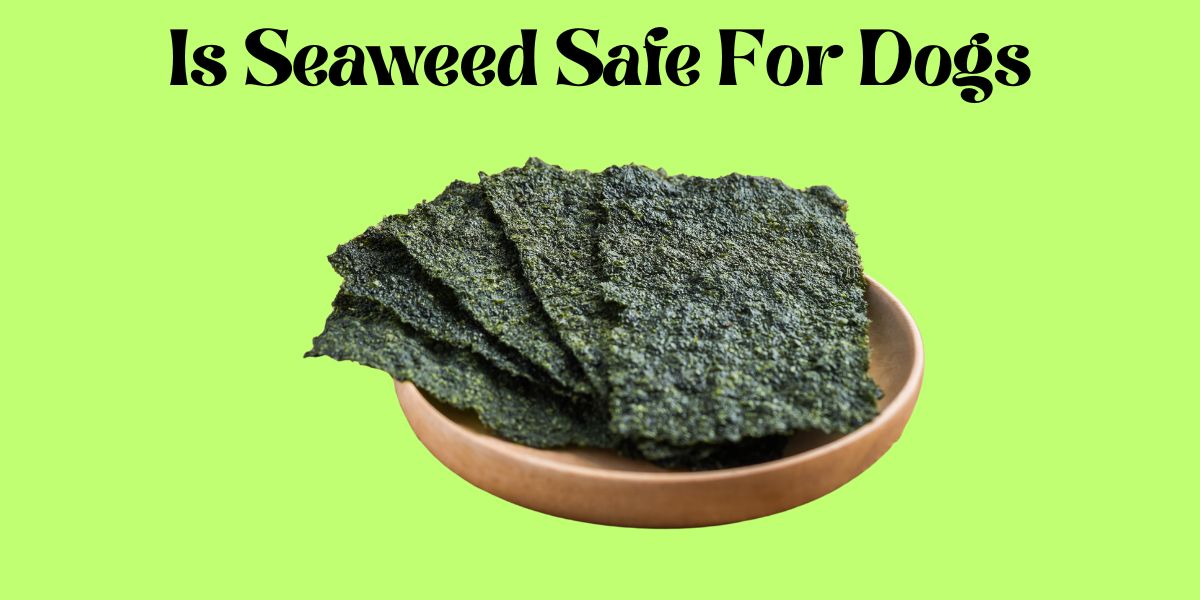Can dogs Consume Seaweed Safely?

Imagine taking a stroll on the beach with your four-legged companion and noticing some seaweed washed up on the shore. As your dog curiously sniffs around and investigates, you find yourself wondering, can dogs consume seaweed safely? In this article, we will explore whether dogs can eat seaweed and the potential benefits and risks associated with this dietary choice for our furry friends. So, if you’ve ever pondered about adding a touch of oceanic greens to your dog’s diet, keep reading to find out all you need to know about dogs and seaweed consumption.
Can dogs consume seaweed safely?
Seaweed is a type of marine algae that has gained popularity in recent years for its numerous health benefits. While many people enjoy incorporating seaweed into their own diets, as a responsible pet owner, you may be wondering if it is safe to offer seaweed to your furry companion. This article aims to provide you with comprehensive information on the topic, including the potential risks and benefits, the types of seaweed that are safe for dogs, how to prepare and serve it, limitations to consider, and signs of seaweed toxicity in dogs. It is important to note that before making any changes to your dog’s diet, it is crucial to consult with your veterinarian to ensure the well-being and safety of your four-legged friend.
Potential risks of dogs consuming seaweed
While seaweed boasts numerous health benefits, there are also potential risks associated with dogs consuming it. One of the main concerns is the high iodine content found in certain types of seaweed, such as kelp and bladderwrack. Excessive iodine intake can lead to thyroid gland dysfunction in dogs, resulting in symptoms like weight fluctuations, hair loss, and even reproductive issues. Additionally, seaweed can be high in fiber, which can cause gastrointestinal upset, such as diarrhea or constipation, if consumed in large amounts. It is vital to keep these risks in mind and exercise caution when introducing seaweed into your dog’s diet.
The nutritional benefits of seaweed for dogs
Seaweed is rich in essential nutrients that can offer various health benefits to dogs. It contains a wide array of vitamins, including A, C, E, and several B vitamins, which are essential for overall health and proper immune function. Furthermore, seaweed is a great source of minerals like iron, calcium, and iodine, which promote strong bones, teeth, and healthy thyroid function. It also contains antioxidants that help combat inflammation and support a healthy aging process. Additionally, the high fiber content in seaweed can aid in digestion and promote a healthy gastrointestinal tract. Despite the potential risks, when fed in moderation and in the appropriate form, seaweed can offer valuable nutrients to your canine companion.

Types of seaweed safe for dogs
Not all types of seaweed are safe for dogs to consume, as some can be toxic and potentially harmful. However, there are specific varieties that are considered safe and suitable for canine consumption. Dulse and nori are two commonly available types of seaweed that are generally safe for dogs. Dulse is known for its low iodine content, making it a good option for dogs that may be sensitive to excessive iodine levels. Nori, often used in sushi rolls, is another low-iodine seaweed that can be a healthy addition to your dog’s diet. It is important to ensure that any seaweed fed to your dog is free from additional seasonings, preservatives, or other potentially harmful additives.
Preparing and serving seaweed to dogs
When offering seaweed to your dog, it is crucial to prepare and serve it properly to ensure their safety and enjoyment. First and foremost, it is essential to purchase seaweed from a trusted source that specializes in pet-safe products. Choose fresh or dried seaweed that is specifically labeled for canine consumption. If you opt for dried seaweed, make sure to rehydrate it before feeding it to your dog. This can be done by soaking the seaweed in water for a few minutes until it becomes soft and pliable. Once prepared, seaweed can be mixed into your dog’s regular food as a dietary supplement or served as a standalone treat. Start by offering a small amount and monitor your dog’s response, gradually increasing the quantity if well-tolerated.

Limitations to consider when feeding seaweed to dogs
While seaweed can be a healthy addition to your dog’s diet, there are several limitations and considerations to keep in mind. As mentioned previously, some types of seaweed, particularly those with high iodine content, can be harmful in excess. Therefore, it is crucial to strictly adhere to the recommended serving size and not exceed it. Additionally, if your dog has any pre-existing medical conditions, such as thyroid issues, or is taking specific medications, it is essential to consult with your veterinarian before introducing seaweed into their diet. Lastly, it is essential to maintain a balanced and varied diet for your dog, ensuring that seaweed is just a small component of their overall nutrition.
Consulting a veterinarian before introducing seaweed into a dog’s diet
Before making any changes to your dog’s diet or introducing new foods such as seaweed, it is highly recommended to consult with your veterinarian. Your veterinarian knows your dog’s individual health history and can provide personalized guidance and recommendations regarding their dietary needs. They can assess your dog’s current diet and determine whether incorporating seaweed is appropriate based on their specific health conditions and nutritional requirements. Furthermore, they can help you navigate the potential risks, benefits, and appropriate serving sizes to ensure the safety and well-being of your canine companion.

Alternatives to feeding dogs seaweed
If you are unsure about introducing seaweed into your dog’s diet or if your veterinarian advises against it, there are various alternative ways to ensure your furry friend receives essential nutrients. Many commercial dog foods now include seaweed or specific seaweed extracts in their formulations, providing the benefits without the need for separate supplementation. Furthermore, there are other nutritious foods that you can incorporate into your dog’s diet, such as lean meats, fruits, and vegetables. Always ensure that any additional foods introduced are suitable for canine consumption and consult with your veterinarian for specific recommendations based on your dog’s individual needs.
Signs of seaweed toxicity in dogs
While seaweed can provide numerous health benefits for dogs, it is essential to be aware of the signs of seaweed toxicity. If your dog consumes excessive amounts of seaweed or ingests a toxic variety, they may exhibit symptoms such as vomiting, diarrhea, excessive salivation, lethargy, trembling, or difficulty breathing. If you notice any of these signs or suspect that your dog may have ingested harmful seaweed, it is crucial to seek immediate veterinary attention. It is always better to err on the side of caution and prioritize your dog’s health and well-being.
Common misconceptions about dogs and seaweed
There are a few common misconceptions regarding dogs and seaweed that are important to address. First, not all seaweed is safe for dogs; some varieties can be toxic and harmful. It is crucial to do thorough research and consult with your veterinarian to ensure that the specific type of seaweed you are considering is safe for canine consumption. Second, while seaweed can offer health benefits, it should not replace a balanced and complete diet for your dog. It is essential to provide a well-rounded nutrition plan that includes a variety of foods to fulfill all of their nutritional needs. Lastly, seaweed should always be introduced gradually and in moderation, following your veterinarian’s guidance, to minimize any potential risks or adverse effects.
Research on the effects of seaweed on dog health
Although scientific research regarding the effects of seaweed on dog health is limited, there have been some studies conducted to explore its potential benefits. Researchers have found that certain seaweed species, particularly those low in iodine, can have antioxidant, anti-inflammatory, and immune-boosting properties in dogs. However, more extensive research is needed to fully understand the physiological effects and optimal utilization of seaweed as a dietary supplement for canines. As the interest in seaweed as a natural health enhancer grows, it is likely that further studies will be conducted to shed more light on its impact on dog health.
In conclusion, while seaweed can provide valuable nutritional benefits to dogs, it is crucial to exercise caution and take certain factors into consideration. Always consult with your veterinarian before introducing any new food into your dog’s diet, including seaweed. Choose appropriate varieties that are safe for canine consumption, prepare and serve them properly, and strictly adhere to recommended serving sizes. Keep in mind the potential risks and limitations, and be aware of signs of seaweed toxicity. By prioritizing your dog’s health and well-being, you can make informed decisions about their diet and ensure their overall happiness and longevity.